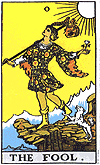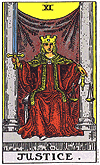
The Fool has had a wonderful week, basking in the glory of all the gifts he's been given by Lady Luck. (He's imagining that the mega-agent who requested a full manuscript from him is reading with delight and can't wait to turn each page). (Post 10, Wheel of Fortune. Previous posts in this series are listed at the bottom of this entry.)
No question, though, that all he's been through the past ten weeks has opened his eyes to the complexities of his quest. There's no straight shot at the Golden Fleece, like he thought there was when he was more naïve. And it turns out that even though he has the heart of a hero, he still has to learn things along the way to become a Conquering Hero. Who knew? (In fact, the more he thinks about some of the feedback he's received, especially the similar suggestions that were made by more than one reader, but that he ignored, the more uneasy he becomes. Now that he really thinks about it, he realizes that his premise and opening are great, but if he'd taken more chances in the middle—gone with his heart as much as his head—his novel could have been breakout for sure. He had felt it might be already, but now that he thinks about it. . . Gah! What shall he do about this?)

One brother is poor and the other is rich. The rich brother has been given the whole inheritance, and the poor brother is not only contesting the will, but demanding that he receive everything himself. Justice listens to the brothers' arguments, then splits the inheritance between them. Neither brother is happy. But Justice says, "With only half the inheritance, the rich brother will stop being so wasteful, and the poor one will have as much as he needs. This is fair."
When the brothers have left, The Fool says to the woman, "You're right, you were fair."
"Yes," she says. "Even though the brothers cannot see it, this decision was good for both of them."
The Fool considers this, and (like any good card-carrying writer) asks the all-important question, "how does this apply to Me and My Quest?" He realizes, soon enough, that the key to Justice's decision was equilibrium. Justice, like Success, must achieve equilibrium to be right, and therefore thrive long term.
The Fool thinks about his own lack of equilibrium. Up until now, except for that stint in the woods as The Hermit a couple of weeks ago, he's spent all his time laser-focused on doing whatever it takes to achieve his Quest. (Yes, it is important to tailor his efforts toward getting published. Part of that process is understanding how the publishing world works and developing his writing—and especially his marketing materials—to suit that world's needs. However, he's been so focused on that aspect that he's sort of lost an important part of himself. The part that loves to write. The part that makes the writing come from the heart. Success isn't just about getting published, it's about bringing something beautiful to life, something that speaks his own personal truths in a way that will touch others deeply.)
The Fool realizes that The Hermit, The Wheel of Fortune, and now, Justice, have given him the tools and awareness he needs to achieve equilibrium. He must feed his spiritual self to balance his material self. Both selves are needed in this quest. He thanks Justice, and looks appreciatively at the scales she holds high. It is time to balance his own inner scales. (If his luck holds and the mega-agent wants to sign him, he knows there will be revisions with a capital R, and he knows just how he's going to search his soul to make them excellent. If she doesn't sign him, he's back on the old path, but with new powers. He's just added equilibrium to his arsenal.)
~Linda
Links to Fool's Journey posts: 0—The Fool; 1—The Magician; 2—The High Priestess; 3—The Empress; 4&5—The Emperor, and The Hierophant; 6—The Lovers; 7—The Chariot; 8—Strength; 9—The Hermit; 10—Wheel of Fortune
My interpretation of The Fool's Journey as it applies to the writer's life is my own, but the Journey is long-established from a variety of sources. Those I've relied on most heavily are: TAROT BASICS by Burger & Fiebig, AECLECTIC TAROT by Thirteen, and EVERYDAY TAROT by Fairfield.
No question, though, that all he's been through the past ten weeks has opened his eyes to the complexities of his quest. There's no straight shot at the Golden Fleece, like he thought there was when he was more naïve. And it turns out that even though he has the heart of a hero, he still has to learn things along the way to become a Conquering Hero. Who knew? (In fact, the more he thinks about some of the feedback he's received, especially the similar suggestions that were made by more than one reader, but that he ignored, the more uneasy he becomes. Now that he really thinks about it, he realizes that his premise and opening are great, but if he'd taken more chances in the middle—gone with his heart as much as his head—his novel could have been breakout for sure. He had felt it might be already, but now that he thinks about it. . . Gah! What shall he do about this?)

He sits down in the middle of the road to ponder. In front of him a blind, wise woman appears, sitting on a throne with a sword in one hand and a set of scales in the other. This is Justice. She's listening to two brothers arguing over an inheritance. The brothers have come to her for judgment.
One brother is poor and the other is rich. The rich brother has been given the whole inheritance, and the poor brother is not only contesting the will, but demanding that he receive everything himself. Justice listens to the brothers' arguments, then splits the inheritance between them. Neither brother is happy. But Justice says, "With only half the inheritance, the rich brother will stop being so wasteful, and the poor one will have as much as he needs. This is fair."
When the brothers have left, The Fool says to the woman, "You're right, you were fair."
"Yes," she says. "Even though the brothers cannot see it, this decision was good for both of them."
The Fool considers this, and (like any good card-carrying writer) asks the all-important question, "how does this apply to Me and My Quest?" He realizes, soon enough, that the key to Justice's decision was equilibrium. Justice, like Success, must achieve equilibrium to be right, and therefore thrive long term.
The Fool thinks about his own lack of equilibrium. Up until now, except for that stint in the woods as The Hermit a couple of weeks ago, he's spent all his time laser-focused on doing whatever it takes to achieve his Quest. (Yes, it is important to tailor his efforts toward getting published. Part of that process is understanding how the publishing world works and developing his writing—and especially his marketing materials—to suit that world's needs. However, he's been so focused on that aspect that he's sort of lost an important part of himself. The part that loves to write. The part that makes the writing come from the heart. Success isn't just about getting published, it's about bringing something beautiful to life, something that speaks his own personal truths in a way that will touch others deeply.)
The Fool realizes that The Hermit, The Wheel of Fortune, and now, Justice, have given him the tools and awareness he needs to achieve equilibrium. He must feed his spiritual self to balance his material self. Both selves are needed in this quest. He thanks Justice, and looks appreciatively at the scales she holds high. It is time to balance his own inner scales. (If his luck holds and the mega-agent wants to sign him, he knows there will be revisions with a capital R, and he knows just how he's going to search his soul to make them excellent. If she doesn't sign him, he's back on the old path, but with new powers. He's just added equilibrium to his arsenal.)
~Linda
Links to Fool's Journey posts: 0—The Fool; 1—The Magician; 2—The High Priestess; 3—The Empress; 4&5—The Emperor, and The Hierophant; 6—The Lovers; 7—The Chariot; 8—Strength; 9—The Hermit; 10—Wheel of Fortune
My interpretation of The Fool's Journey as it applies to the writer's life is my own, but the Journey is long-established from a variety of sources. Those I've relied on most heavily are: TAROT BASICS by Burger & Fiebig, AECLECTIC TAROT by Thirteen, and EVERYDAY TAROT by Fairfield.
Linda, I love this. Justice. And once again the fool is on my path.
ReplyDelete"Success isn't just about getting published, it's about bringing something beautiful to life, something that speaks his own personal truths in a way that will touch others deeply"
Thank you for the inspiring journey of the fool. Justice is not about winning... but doing what is right. Have a Happy 4th!
Thanks, Karlene. You have a wonderful 4th, too, and I know you and Justice will work together just fine on your path!
ReplyDeleteAh equilibrium, it can be so elusive. Personal truths, yes, that's what it is all about! The journey is just as important as the destination. Not just a great catchphrase, but good advice. This part of the Fool's journey hits home for a lot of us!
ReplyDeleteIt does hit home, doesn't it, Heather? Equilibrium's not always exciting, but it's certainly necessary!
ReplyDelete